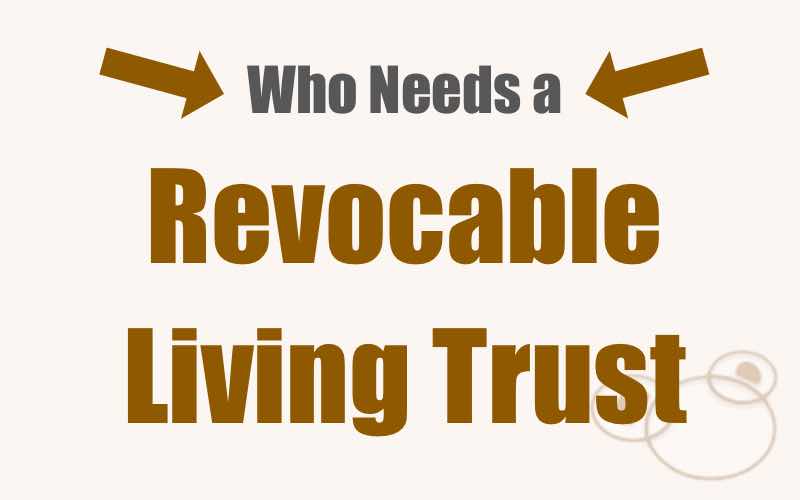If you’re a real estate owner and a parent, you will find that setting up a revocable living trust to be quite useful.
In fact, setting up a revocable living trust and creating a will goes hand in hand when it comes to estate planning.
One of the main benefits of setting up a revocable living trust is to bypass a judicial process called probate. This process occurs once you passed away and the judge would have to decide how your assets will be distributed.
Today we’ll discuss what a revocable living trust is and why you should consider having one.

This post may contain affiliate links, which means I may receive a commission, at no extra cost to you, if you make a purchase through a link. Please see my full disclosure for further information.
What Is a Revocable Living Trust
A revocable living trust is a legal document that details how your assets will be handled once you passed away.
Even though setting up a revocable living trust could be emotionally difficult (just like drafting a will), it’s an important step to safeguard your assets.
If you have children, you’ll want to ensure that they’ll be taken care of by the right people and with the assets you have left over.
A revocable living trust, along with a pour-over will, will do exactly that.
Sometimes, a revocable living trust is also known as a ‘living trust’ or a ‘revocable trust.’ But, they all mean the same thing!
On the other hand, a revocable trust should not be confused with an IRREVOCABLE trust.
Revocable vs. Irrevocable Trust
There is a strong distinction between revocable and irrevocable living trust.
A revocable living trust is just that, revocable. This means that you can change it, amend it, or rip it up at anytime.
An irrevocable trust, on the other hand, means that once you have transferred assets to the trust, you relinquish ownership. This type of trust is beneficial for asset protections against creditors or lawsuits, and it’s mostly used for business owners.
However, for the most part, a revocable living trust is more suitable for those with simple asset holdings. This includes real estates such as a primary residence, rental properties or timeshares where you want to bypass the probate process.
Why Probate Should Be Avoided
Without a revocable living trust, your assets will automatically go through a public judicial process called probate. This process will start with or without the presence of a will.
However, with a will, the judge will most likely assign your assets based on what’s written in it. That is, if it’s written properly of course. You can do so by using an online legal tool.
In any case, probate is a costly and lengthy process. Imagine you passed away (I know it’s hard), and your heirs have to go to the court while arranging for your funeral. This could be a traumatic and emotional experience altogether.
Meanwhile, the court could take a year or more to assign assets through the probate process. All of this adds up to wasted time and unnecessary court fees.
Therefore if you could set up a revocable living trust while you’re healthy and able, this will avoid a lot of headaches for your heirs.
How to Make a Revocable Living Trust a Legal Document
Most revocable living trusts require notary, but the exact requirement could differ by state law.
For example, a revocable living trust created in California must be signed by you and the presence of a notary public. You can probably find one at a local bank and all you have to do is bring your legal ID as well as pay a notary fee.
Once the document is signed and notarized, you’ll need to ensure that the the title of your assets to be transferred to the trust.
For example, if you hold a primary residence, you should have a deed. This deed should normally have your name as well as any co-owner. You’ll now need to change the title name to that of the trust.
However, if your situation is complicated whereby you own a place with multiple co-owners or assets in multiple states, you may want to consult a lawyer to help you with the transfer process.
But if all you have is a primary residence, and/or a few rental properties within the same state, then all you need is to change the title of the deed to the name of your trust. You can also do this by using an online legal tool such as Trust & Will.
Once again, your situation may be unique and if that’s the case, it may be best to consult with a legal professional.
Who Needs a Revocable Living Trust?
A revocable living trust is a great wealth transfer tool for those with assets especially real estates.
If you’re a parent who owns at least one property, it’s wise to set up a revocable living trust. Here you can assign beneficiaries who can take over your assets without going through probate.
Without a revocable living trust, your real estates will surely go through the probate process which is both costly and time-consuming. Since probate is a public judicial process, your assets will also be listed publicly.
Therefore, having a revocable living trust does not only ensure wealth transfer, but to do so privately.
Related: Estate Planning: Three Ways to Protect Your Assets and Your Child

PIN this for later

